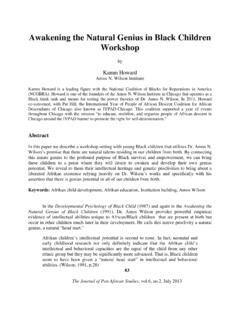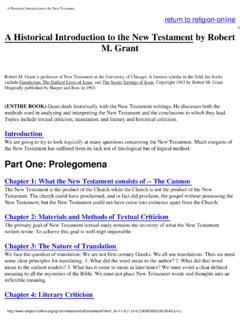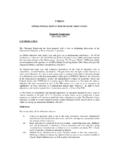Transcription of Interrogating Misconceptions of Feminism in Tracy …
1 Interrogating Misconceptions of Feminism in Tracy Chima Utoh s Our Wives Have Gone Mad Again and Stella Dia Oyedepo s The Rebellion of the Bumpy-chested by Adeleke, Senior Lecturer, Department of English and Literature University of Benin, Benin City, Edo State, Nigeria Abstract This essay examines the attitudes and actions of the female characters in Tracy Utoh s Our Wives Have Gone Mad Again and Stella Dia Oyedepo s The Rebellion of the Bumpy-chested. It establishes that these women are deployed as parodies of male chauvinism and misinterpretations of Feminism . Thus, the female characters enact extreme and violent chauvinistic male attitudes. Ironically, the irrational and militant acts of the women depicted by the playwrights are the same attitudes that men have always been criticized for and women have always protested against in Feminism (s).
2 The essay demonstrates that while the two plays confirm the reality of the women s subjection and the need for Feminism ; however, the plays also emphasize the ironies embedded in irrational application of feminist concepts. It illustrates that Utoh and Oyedepo deploy a reverse of male chauvinism, codified as radical Feminism , to warn their readers about the dangers of extreme attitudes. The essay concludes the farcical irrationality of the women in these plays diminishes the reality of the woman s oppression, detracts from and trivializes the seriousness of feminist ideals and enables negative Misconceptions about Feminism . It also highlights an interesting message skillfully underlying both plays; that Feminism is for Every Body because human nature is essentially the same in men and women in positions of power and without the restraints of deeply inscribed cultural constructs.
3 126 Africology: The Journal of Pan African Studies, , , April 2017 Introduction Tracy Utoh s Our Wives Have Gone Mad Again (Our Wives),and Stella Oyedepo s The Rebellion of the Bumpy-chested (The Rebellion) present female characters who employ negatively spectacular methods of dethroning male oppression and supremacy in society. The women in Our Wives, Irene, Ene, Funmi, Mairo and Ifeoma, regard men their husbands in particular as different grades and degrees of imbeciles, necessary evils (23), and good for nothing piece of liability (32) over whom the women seek to exercise complete authority. They form an informal interest group seeking to re-arrange society to give women dominance by all means possible, including acts of physical violence.
4 Similarly, The Rebellion features women whose tough feminist agenda is clearly stated by Captain Sharp, the leader of a women s liberation movement -The Bumpy-chested Movement ( ): Our activities henceforth must have a volcanic impact on the status quo of men vis a vis women. This existing order must be blown into infinitesimal fragments! A new order must emerge. This life of drudgery to which women have been sentenced throughout the ages must alter for a better one. Men must be asked to descend from Olympic heights in which they have carved an exclusive niche and shake hands with women on the platform of equality. Women must emerge from the state of submissiveness to that of parity if not of dominance. (The Rebellion, 16 -17) Sharp s forceful statement indicates a consciousness of socio-cultural oppression of the woman, and a determination to bring about volcanic changes to this situation, and if possible, a reversal of the situation.
5 Capt. Sharp gathers women in a more defined activist group. The essay aligns itself with Osita Ezenwanebe s assertion in reference to The Rebellion: The brand of Feminism illustrated in Oyedepo [and Utoh s plays] ..is taken erroneously as the goal of Feminism (187), Ezenwanebe explains that attitudes such as those displayed in Our Wives and The Rebellion give Feminism a negative undertone and cause many scholars to dissociate themselves from feminist struggles despite the fact that the oppression and marginalization of women are real (187).Indeed, Feminism in any variation should not be a threat to societal peace. This essay, therefore, gives a critical evaluation of the methods the women employ to achieve liberation from male domination, the nature of Feminism implicit in the methods they apply and the implications of the brand of Feminism they utilize in dismantling oppressive practices.
6 The conduct of women and the manner in which Utoh and Oyedepo have presented them are analyzed in detail to decipher the underlying messages about Feminism in the plays. 127 Africology: The Journal of Pan African Studies, , , April 2017 Evaluating Feminism , Marilyn French avers: Feminism is the only serious, coherent and universal philosophy that offers an alternative to patriarchal thinking and Feminists believe that women are human beings, that the two sexes are (at least) equal in all significant ways, and that this equality must be publicly recognized. They believe that qualities traditionally associated with women - the feminine principle are (at least) equal in value to that associated with men masculine principle and that this equality must be publicly recognized.
7 (442) Similarly, bell hooks describes Feminism as: .. a struggle against sexist oppression. Its aim is not to benefit solely any specific group of women, any particular race or class of women. It does not privilege women over men. It has the power to transform in a meaningful way all our lives. Most importantly, Feminism is neither a life style nor a readymade identity or role one can step into. (51) French emphasizes a publicly recognized position of equality between the sexes and hooks specifically points out that while Feminism opposes sexist oppression, it does not privilege women over men. Thus hooks title her book: Feminism is for Every Body. In line with French and hooks, Christine Odi describes feminists: all proactive feminist thinkers concur that Feminism is an ideological construct which seeks to achieve equality between men and women (43).
8 Thus Feminism , in its various styles and stances, seeks to eradicate all forms of women s oppression and correct the imbalance in the relationship between men and women. Although there is a consensus among feminists about liberating women from the shackles of oppression and marginalization, achieving equal rights and privileges with the men, there is no consensus as to how this is to be achieved. This lack of coherence in terms of methodology is responsible for the different styles of Feminism depicted in contemporary African drama. Radical Feminism , the variant of Feminism deployed by Utoh and Oyedepo s female characters, is presented in the plays as extreme, irrational and even destructive. Paul Goring, Jeremy Hawthorn and Domhnall Mitchell maintain that radical Feminism usually consists of a rejection of most or all forms of collaboration with men or with organizations containing men.
9 Radical Feminism tends to be universalizing rather than to focus upon the socially, culturally, and historically specific characteristics of patriarchy [it fights against] (195). Thus, it regards the male-controlled capitalist hierarchy as sexist and the defining feature of women s oppression. 128 Africology: The Journal of Pan African Studies, , , April 2017 Radical feminists believe that women can free themselves only when they have done away with what they consider as inherently oppressive and dominating patriarchal system. The universalizing quality of radical Feminism , pointed out by Goring et all, aptly describes the activities of the women in the plays studied in this essay. Hence members of the informal sisterhood in Our Wives and the army of women led by Capt.
10 Sharp in The Rebellion, unanimously identify the enemy as man, specifically the husbands of members irrespective of whether the man is guilty or not. Jointly, they map out strategies not only to dethrone the man, but to take over his oppressive role. These women entertain no alternatives other than the total uprooting and reconstruction of social structures. Differences in cultural context, individual situations and mitigating circumstances are not taken into consideration. The reader witnesses an unreasonable bandwagon effect which has given rise to unfavorable views of Feminism in spite of the fact that history and literature provide ample evidence of the woman s oppression and subjugation, particularly in patriarchal social systems. Nigerian drama is relentlessly deployed to record the Nigerian woman s oppression and simultaneously offer methods of resistance and liberation.











